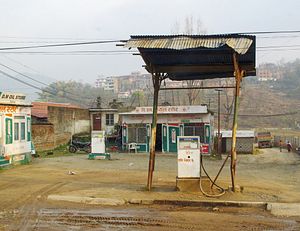China will supply gasoline to Nepal for the first time ever, in response to a dire fuel shortage caused by disrupted supply lines with India. A Nepal Oil Corporation official announced on Sunday that China would supply 1.3 million liters of gasoline, which would be transported to Kathmandu from the border via 100 tanker trucks.
As my colleague Ankit reported previously, crucial supplies from India stopped flowing across the India-Nepal border in mid-September, just after Nepal ratified its new constitution. The Madhesi and Tharu ethnic groups are protesting against the constitution, saying it will leave them underrepresented in Nepal’s government. India has urged Kathmandu to address their concerns. In that context, many Nepalis see the halt of border trade as an unofficial blockade designed to pressure Nepal into changing its constitution.
That’s also the official position from Kathmandu. “Our stand is this is a vengeance from India as they are not happy with Nepal’s new constitution. This is a trade blockade, just not officially announced,” Nepali Home Ministry spokesperson Laxmi Prasad Dhakal said in a statement in late September.
India, however, maintains that there is no blockade, saying that truck drives from India are simply unable to cross into Nepal due to ongoing protests. That explanation hasn’t satisfied Nepal – some protesters even marched in Kathmandu carrying an effigy of Indian Prime Minister Narendra Modi (which was subsequently confiscated by police, according to Reuters).
According to Nepal’s Himalayan Times, as of this week, “Only few tankers of fuel have been sent to Nepal from India when Nepal needs about 250 tankers of fuel on a daily basis.” Nepal has had to institute fuel rationing, including restrictions on car usage.
The fuel shortage – and resulting public anger at India – gives China a major opportunity to win some of the goodwill that India has lost by stepping into the breach and providing fuel. However, there was a complication: the China-Nepal border had been closed off since the April 25 earthquake in Nepal due to blocked roads, China’s foreign ministry said earlier this month. The border crossing at Jilung reopened in mid-October, with China immediately transferring unspecified “assistance supplies” to Nepal, Chinese Foreign Ministry spokesperson Hua Chunying said.
Now China finally appears ready to begin supplying fuel to Nepal. When asked about the reports, Hua said that “the Chinese side is ready to offer necessary assistance at the request of the Nepali government as a friendly neighbor to relieve its shortage of fuel supply.” Hua added that “the Chinese and Nepali sides are in close communication on that.”
Using its official Twitter account, People’s Daily tweeted that Nepali officials headed to China on Monday to negotiate a fuel deal to address the shortage. Notably, the tweet included the hashtag #IndiaBlockadesNepal.
Nepal’s Himalayan Times said that a team of high-ranking officials (including the joint secretaries of Nepal’s ministries of commerce, finance, and foreign affairs, as well as Nepal’s ambassador to China) made the trip to China on Monday. Citing a Nepal Oil Corporation spokesperson, Himalayan Times said the team would “discuss the alternatives and solutions of present fuel crisis with Chinese representatives,” including both the means of importing the fuel and the prices involved.
Those discussions are separate from the 1.3 million liters of gasoline promised by China already, according to Minister for Commerce and Supplies Ganesh Man Pun. Pun said that the promised fuel was a grant, and would arrive with a few days. The negotiations in China are aimed at discussing “regular and long-term trade” of fuel supplies from China to Nepal.
Such “long-term trade” would reduce Nepal’s reliance on India for fuel and increase the volume of China-Nepal trade–at New Delhi’s expense.

































